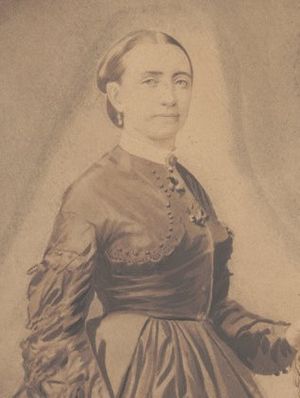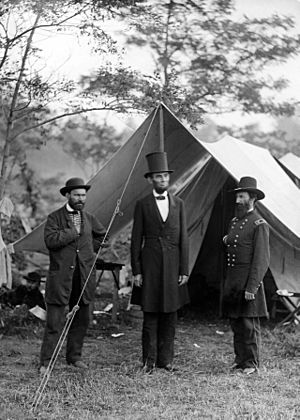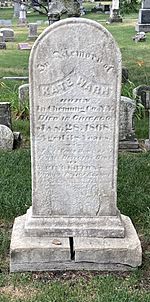Kate Warne facts for kids
Quick facts for kids
Kate Warne
|
|
|---|---|
 |
|
| Born | 1833 Erin, New York, U.S.
|
| Died | January 28, 1868 (aged 34–35) Chicago, Illinois, U.S.
|
| Resting place | Graceland Cemetery, Chicago, Illinois |
| Occupation | Detective, spy, female superintendent of detectives, supervisor of women agents |
| Known for | First female detective in the Pinkerton Detective Agency, and the first female detective in the United States, responsible for uncovering the 1861 Baltimore Plot to assassinate president-elect Abraham Lincoln |
Kate Warne (born in 1833 – died January 28, 1868) was an American law enforcement officer. She is famous for being the first female detective in the Pinkerton Detective Agency. This also made her the first female detective in the entire United States, starting in 1856.
Contents
Becoming a Detective
How Kate Warne Joined Pinkerton
Not much is known about Kate Warne's early life. We know she was born in Erin, Chemung County, New York. By the age of 23, she was a widow.
Kate Warne applied to the Pinkerton Detective Agency after seeing an advertisement. At first, Allan Pinkerton, the agency's founder, was surprised. He had never thought about hiring a female detective before.
However, Kate Warne convinced him that women could be very helpful. She argued that women could gain trust in ways men could not. Pinkerton agreed and hired her, making her the first female detective.
Early Cases and Successes
Allan Pinkerton quickly saw Kate Warne's skills. In 1858, she worked on a big case involving the Adams Express Company. Money had been stolen by a man named Mr. Maroney.
Kate Warne became friends with Mr. Maroney's wife. She gained her trust and gathered important information. This evidence helped convict Mr. Maroney, and most of the stolen money was returned.
By 1860, Allan Pinkerton was so impressed that he put Kate Warne in charge. She became the head of his new Female Detective Bureau. This was a big step for women in law enforcement.
The Baltimore Plot
Uncovering a Secret Plan
In 1861, Abraham Lincoln was about to become president. He was traveling by train from his home to Washington, D.C. Allan Pinkerton was hired to investigate threats to the railroad in Maryland.
During his investigation, Pinkerton discovered something much bigger. There was a secret plan to harm or even assassinate Lincoln in Baltimore, Maryland. Baltimore was a place where many people disagreed with Lincoln.
Kate Warne was one of five agents sent to Baltimore to investigate. She used different fake names, like Mrs. Cherry and Mrs. M. Barley. She watched suspicious people and movements.
Kate Warne's Key Role
Kate Warne was crucial in uncovering the plot. She became friends with some of the people involved in the secret plan. She gathered many important details about how they planned to attack Lincoln.
Lincoln's train journey was planned to stop in many cities. His last stop before Washington, D.C., was Harrisburg, Pennsylvania. From Harrisburg, he had to travel to Baltimore. In Baltimore, passengers had to switch trains because the tracks did not connect. This meant Lincoln would have to travel about a mile by carriage through the city. This was a dangerous part of his journey.
Protecting President Lincoln
After learning the details, Pinkerton sent Kate Warne to New York City. She delivered a secret letter to one of Lincoln's friends, Norman B. Judd. The letter explained the assassination plot.
At first, Lincoln was not sure if the plot was real. But when another source confirmed the danger, he agreed to take action. Lincoln decided to change his travel plans to avoid the danger in Baltimore.
Kate Warne helped make the secret arrangements. Lincoln finished his planned events in Harrisburg. Then, he secretly changed into a disguise, looking like a sick traveler. Pinkerton made sure no one could send messages about the change in Lincoln's schedule.
Kate Warne, Pinkerton, and others helped Lincoln get onto a train in Harrisburg. She greeted him loudly as if he were her brother, to make his disguise seem real.
Lincoln traveled by special trains to Philadelphia and then to Baltimore. Kate Warne stayed awake all night, guarding Lincoln. Thanks to her help and the disguises she provided, Lincoln passed through Baltimore without anyone recognizing him. He arrived safely in Washington, D.C., to become president.
It is said that Pinkerton's agency motto, "We Never Sleep," came from Kate Warne's tireless watch over Lincoln that night. She was vital in stopping the Baltimore Plot.
Working During the Civil War
Spying for the Union
During the American Civil War, Allan Pinkerton and Kate Warne worked for the Union army. They gathered secret information, acting like spies. Kate Warne was very good at this.
She could easily join social gatherings in the Southern states. She believed that women were better at getting secrets in places where men could not. Kate Warne often pretended to be Pinkerton's wife while working undercover. She used many different fake names, like Kitty Warne.
Kate Warne was the Female Superintendent of Detectives. This meant she was in charge of all the women agents. She traveled with Allan Pinkerton and helped set up a military intelligence office in Cincinnati, Ohio. This office helped General George B. McClellan's army.

After the Civil War
Solving Tough Cases
After the Civil War ended in 1865, Kate Warne continued her detective work. She worked on several important cases.
In one case, a bank teller named George Gordon was murdered, and a lot of money was stolen. Pinkerton suspected a man named Alexander P. Drysdale. To get proof, Kate Warne went undercover as "Mrs. Potter." She became close friends with Drysdale's wife. Through this plan, they found out where Drysdale had hidden the stolen money.
In another case, a Captain Sumner believed his sister was trying to poison him and another person. Kate Warne pretended to be a fortune teller named Lucille. This helped her get information from people close to the suspects.
Kate Warne also managed Pinkerton's other female detectives. Allan Pinkerton thought she was one of his five best detectives. Her work was very important for women's history. Women were not allowed to be police officers until much later, in the early 1900s.
Pinkerton often wrote about Kate Warne in his memoirs. He trusted her deeply and praised her work. She was a key part of his agency's success.
Burial
Kate Warne died on January 28, 1868, from lung problems. She was buried in the Pinkerton Family Plot at Graceland Cemetery in Chicago, Illinois. Her gravestone has a small spelling mistake, showing "Warn" instead of "Warne." Allan Pinkerton made sure her burial spot would always be safe and never sold.
See also
- American Civil War spies
- Hattie Lawton
- Timothy Webster
- Allan Pinkerton
 | John T. Biggers |
 | Thomas Blackshear |
 | Mark Bradford |
 | Beverly Buchanan |


